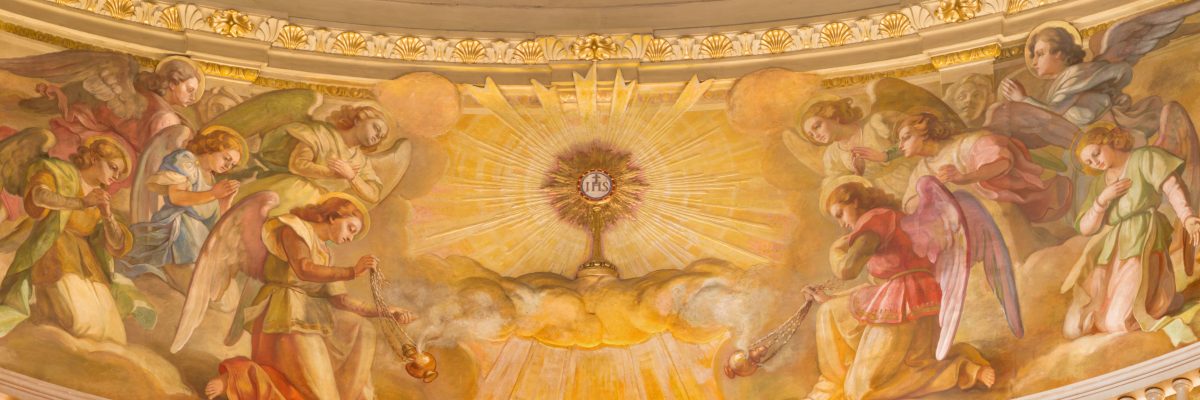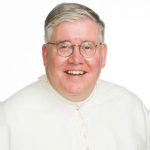
Homily for the Third Sunday in Ordinary Time, Year B
Then they came to Capernaum,
and on the sabbath Jesus entered the synagogue and taught.
The people were astonished at his teaching,
for he taught them as one having authority and not as the scribes.
In their synagogue was a man with an unclean spirit;
he cried out, “What have you to do with us, Jesus of Nazareth?
Have you come to destroy us?
I know who you are—the Holy One of God!“
Jesus rebuked him and said,
“Quiet! Come out of him!“
The unclean spirit convulsed him and with a loud cry came out of him.
All were amazed and asked one another,
“What is this?
A new teaching with authority.
He commands even the unclean spirits and they obey him.“
His fame spread everywhere throughout the whole region of Galilee.— Mark 1:21-28
One may see the substantial ruins of the synagogue of Capernaum on the site where the events of this Sunday’s Gospel lesson took place. The dark basalt foundation underlying the present remains is the actual foundation of the synagogue of Our Lord’s time. It is very moving to go there and place one’s hand or touch one’s rosary to this stone. Doing so, the pilgrim may share a bit in the astonishment and amazement with which St. Mark tells us the people were filled at the Lord’s teaching and power.
Today’s events from the first chapter of Mark’s Gospel are just the beginning of Our Lord’s preaching and healing and delivering in the hometown of the brothers Peter and Andrew, and James and John, as well as of Matthew. “Just the beginning” indeed, since it would be in this same synagogue a couple of years later that Our Lord would give the most difficult and controversial sermon of his ministry. This was his eucharistic discourse found in the sixth chapter of the Gospel of St. John. By then the people had become used to Jesus and his teaching and his wonders. So when he told them of that most amazing and astonishing of his teachings and his works of power, namely of the “wonderful sacrament” of his body and blood, they were not amazed or astonished at him, as they were in the beginning; rather, John tells us, they murmured and disputed among themselves, and even stopped following him at all.
But there were those who did not go away, first among them as always, Peter, who said, “Lord to whom shall we go? You have the words of everlasting life. And we have believed and we have come to know that you are the Christ, the Son of God.” Those who went away separated themselves from the words of truth and wisdom that they had previously heard with astonishment; those who remained continued in the path of truth and wisdom.
Astonishment (or stupor) and amazement (or admiratio) are, according to St. Thomas, two kinds of fear. These kinds of fear tell us, in the case of astonishment or stupefaction, that we are before something so unusual and unexpected that we cannot fully grasp the cause of it, and in the case of amazement or wonder, that we are before a teaching far beyond our understanding. Now we all know how well motivated and hopeful students will be, driven by this fear to find out about the cause, to understand what seems so very beyond us. The unhappy student, however, will only murmur and complain that it is all too hard or too outlandish, and he will be content to argue. And so he never learns.
“The beginning of wisdom is fear of the Lord,” the wise man of Proverbs tells us. And the beginning of our search for wisdom is the wonder and stupor we experience before the great unknowns that are presented to us. Peter and those who continued to follow the Lord had not lost their sense of holy fear before the mysteries he taught and accomplished in their midst. Thus they clung to him even when his teaching was difficult to understand or accept. And so they were worthy to hear his message: “Do not be afraid, it is I.”
How do we maintain this holy amazement and wonder, this devout fear in searching out holy things? It is important to know how to do this, for on this wondering contemplation may hang our final perseverance in following the Savior. First and foremost we need to meditate on the mysteries of our faith daily and with confidence.
Our Lady has given us the perfect means to do this in the holy rosary. In this prayer, we can consider all the “marvels of God’s law” the law that tells us “Perfect love casts out fear.” We can serenely consider the whole wonderful arc of the lives of Jesus and Mary and so be moved to keep on following them through the joy, sorrow, light, and glory of this earthly life on the way to heaven.
To help us in meditating there are great works of spiritual reading we could undertake to read. One might be The Lord by Romano Guardini, a book loved much by both Pope Francis and Pope Benedict, or another, vastly different in style, but full of spiritual wisdom, The Mystical City of God, by the Venerable Mary of Agreda, a work loved by three holy ones of our American continent: Bl. Solanus Casey, Bl. Katherine Drexel, and St. Junipero Serra. And there are so many other works on the life of the Lord and his mother that could occupy us and increase our loving wonder at God’s goodness.
Then, and most of all, we have the most holy sacrament of the altar, the Holy Eucharist. St. John Paul II, in his encyclical letter Ecclesia de Eucharistia, spoke explicitly of the need to reawaken “eucharistic astonishment”—stupor eucharisticus—in our meditation and treatment of the holy sacrament. When we come to Holy Mass conscious that we are assisting at nothing less than the sacrifice of Calvary, and that the Lord is substantially present among us, and when we come with holy reverence before his enduring eucharistic presence in the tabernacles of our churches, we guarantee our growth in wisdom, and we come close to him.
Coming before the sacrament of love we should read the Church’s own most authentic words, the Gospels and the Psalms, and come to know the Lord and the thoughts of his heart in words inspired by the Holy Spirit. This is how the liturgy approaches the mystery of faith, the body and blood of the Lord. At every Holy Mass, the Church turns to her eucharistic Lord and, rejecting the murmuring and contention of unbelief, says with St. Peter, “Lord, to whom shall we go? You have the words of everlasting life.”
The English, Greek and Latin words for astonishment all come from words that refer to being struck or hit by something great: struck dumb, struck silent, moved to amazed contemplation. May the Lord grant us a great measure of these affections of holy fear so that we may learn to love him, so marvelous, so wonderful in his words and works of power. Thus we will always follow him and never go away.



